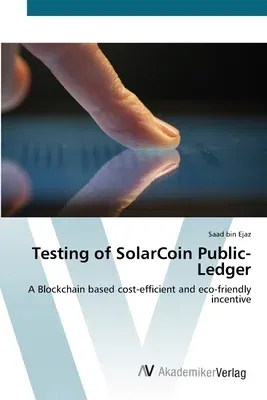Saad Bin Ejaz
(Author)Testing of SolarCoin Public-LedgerPaperback, 23 August 2019

Qty
1
Turbo
Ships in 2 - 3 days
In Stock
Free Delivery
Cash on Delivery
15 Days
Free Returns
Secure Checkout
Print Length
128 pages
Language
English
Publisher
AV Akademikerverlag
Date Published
23 Aug 2019
ISBN-10
6202225130
ISBN-13
9786202225137
Description
Product Details
Author:
Book Format:
Paperback
Country of Origin:
US
Date Published:
23 August 2019
Dimensions:
22.86 x
15.24 x
0.76 cm
ISBN-10:
6202225130
ISBN-13:
9786202225137
Language:
English
Pages:
128
Publisher:
Weight:
199.58 gm

